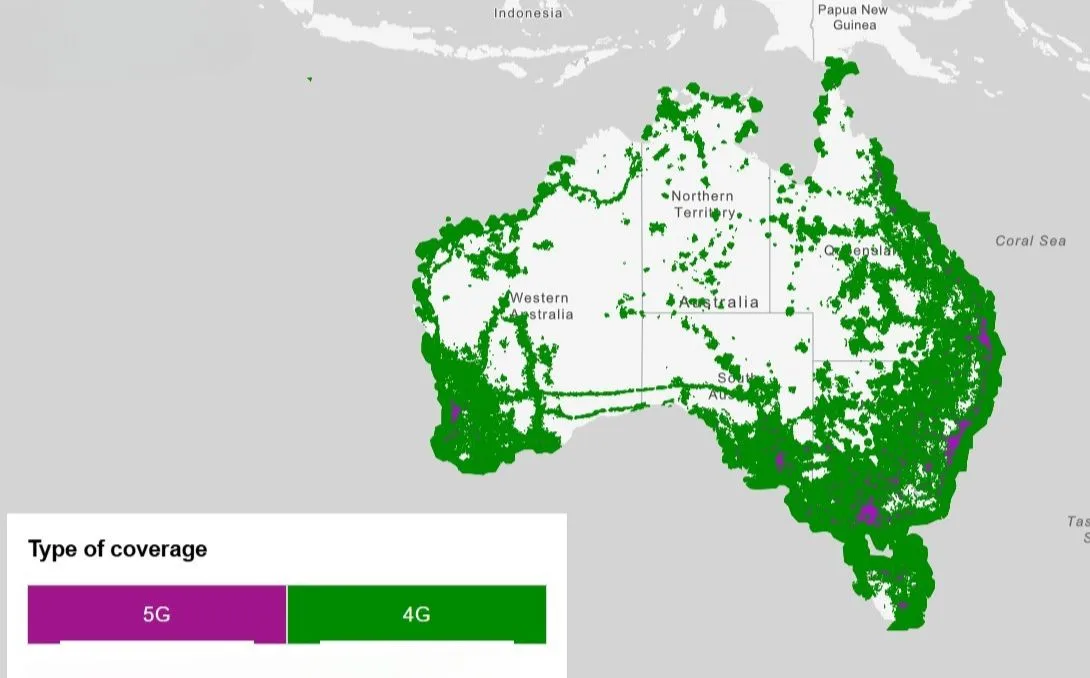
Key takeaways
- Telstra plans provide the best mobile coverage in Australia, especially for users in regional areas. They are also the most expensive.
- Vodafone plans are the cheapest making them a good choice for budget-conscious users. It has the least reliable network of the three.
- Optus lands somewhere in the middle in terms of coverage and pricing. Its plans often have more generous data inclusions.
Every mobile plan in Australia connects to one of just three networks: Optus, Telstra or Vodafone/TPG Telecom.
These are known as the "Big Three", and they provide the mobile coverage that all other Aussie telcos rely on, from amaysim (Optus) to ZenSim (Vodafone).
For the purposes of this guide we're going to be focusing on the full networks from Telstra, Optus and Vodafone. (You can compare other telco plans here.)
The best network depends on a range of factors, including your location, budget and how much data you require each month.
We've done the research to determine how the big three compare across each metric.
Best mobile coverage: Telstra
Telstra has the largest network in Australia, servicing 99.7% of Australians right across the country.
While Vodafone and Optus have improved their regional coverage in recent years, Telstra remains the most reliable choice if you live a long way off the beaten track.
This is backed by independent research from the analytics company Opensignal.
Opensignal measured the geographic coverage of Telstra, Optus and Vodafone in populated areas using a metric scale of 0 to 10.
It found Telstra to have the widest and largest geographic footprint of coverage in populated areas out of all mobile operators in Australia:
It's worth noting that network reliability is especially important in regional areas. Aussies in capital cities will definitely receive a signal from all 3 networks with the strength depending on your proximity to 4G and 5G towers.
Coverage breakdown
Australia is a huge and sparsely populated continent. When telcos talk about network coverage, they're referring to population rather than landmass. For example, Telstra's mobile network covers 99.7% of the Australian population but only 39% of the Australian landmass.
Let's take a look at their current coverage levels.

The white areas on the map are unable to receive a mobile signal. (Image: Telstra)
Telstra coverage
Telstra has the largest network in Australia, servicing 99.7% of Australians across roughly 3 million square kilometres.
For 5G coverage, the number drops down to 95%.
Outside of major cities, Telstra has a much larger percentage of 5G capable sites compared to Vodafone and Optus.
All Telstra mobile plans come with free 5G access, where available.
Telstra is currently the best performing telco for regional coverage. Its 4G service is designed to enhance coverage in regional areas and satellite messaging is now available on selected plans
Telstra also provides access to free mobile internet via Wi-Fi-enabled payphones across the country.
You can check out an interactive map on Telstra's website to see if your address is covered.
Optus coverage
Optus' mobile network covers around 98.5% of the Australian population making it the second largest network of the three.
In recent years, Optus has begun to outpace Telstra in the construction of 5G sites. However, the majority of these are concentrated in major cities, whereas Telstra has spread its rollout more evenly across the country.
According to Optus' most recent figures, its 5G network reaches around 80.5% of the Australian population.
Like Telstra, Optus utilises an enhanced 4G network in regional areas which combines multiple network bands to boost download speeds and extend coverage.
Head to Optus' interactive coverage map to see if your address is covered.
Vodafone coverage
Following a recent network expansion, Vodafone now reaches approximately 98.4% of the Aussie population.
This puts it a whisker behind Optus when comparing all network types, although its 5G footprint is significantly smaller.
Vodafone was the last of the three to roll out its 5G network so it's had a bit of catching up to do. According to ACCC's most recent Mobile Infrastructure Report, Vodafone has 3,050 5G sites, compared to 5,082 for Telstra and 4,038 for Optus.
As mentioned above, Vodafone has massively expanded its mobile coverage via a network-sharing agreement with Optus. Its network now covers 1,000,000 square kilometres (up from 400,000), allowing it to reach significantly more regional Australians.
Customers in remote areas can also benefit from Vodafone's enhanced multi-band 4G network which delivers faster speeds and increased bandwidth.
You can use Vodafone's network coverage checker to see if your area is covered.
Telstra vs Optus vs Vodafone: network coverage compared
| Provider | Total network coverage | 5G sites |
|---|---|---|
| Telstra | 99.6 % | 5,082 sites |
| Optus | 98.5% | 4,038 sites |
| Vodafone (TPG) | 98.4 % | 3,050 sites |
Best network speeds: Optus
A reliable mobile service isn't just about coverage - you also need good network speeds. This is especially important if you regularly download apps and stream 4K video.
In Opensignal's 2025 Australia Mobile Network Experience report, Optus returned the fastest average download speeds.
The average download speed experienced by Opensignal users across Optus' 4G and 5G networks were 54.7Mbps and 212.3Mbps, respectively. Telstra and Vodafone were both significantly slower during testing.
Here's how the big three compared:
Best value plans: Vodafone
Outside of promotions (where Optus sometimes has the edge), Vodafone remains the cheapest option of the three. Its prepaid plans start at $35, with generous inclusions for the asking price.
With that said, none of the three major providers - Vodafone, Optus, or Telstra - are particularly competitive on pricing.
If you want the cheapest plan possible, go for a budget MVNO for $20 a month. (The trade-off is slower network speeds and less reliable coverage.)
Cheapest plans: Optus vs Vodafone vs Telstra
| Plan name | Price | Data | Calls & texts |
|---|---|---|---|
| Optus Standard Flex Plus | $35 | 20GB | Unlimited |
| Vodafone Prepaid Plus | $35 | 25GB | Unlimited |
| Telstra $39 Prepaid SIM | $39 | 15GB | Unlimited |

Best for data allowance: Optus
Vodafone gives customers slightly better data allowances across all plan types. However, we're giving the win to Optus due to its generous sign-up offers which usually last for at least 3 recharges.
For example, at the time of writing it was possible to get 65GB on a prepaid Optus plan for just $17. (Similar deals are offered on a semi-regular basis.)
The addition of unlimited data on weekends boosts the overall value of Optus prepaid plans considerably.
Data breakdown
The average Australian churns through around 14GB of mobile data per month.
Telstra, Optus and Vodafone provide significantly more than this on their entry-level plans, which is something to keep in mind if you're a light user.
All three telcos provide identical data banking (up to 200GB) on selected monthly plans.
Telstra vs Optus vs Vodafone: Prepaid
Prepaid is the most popular plan type in Australia. You pay upfront and can only use a set amount of data per month.
If you go over, network access is usually blocked until you recharge or buy additional data packs. (Some auto-renewal plans slow your download speeds instead.)
Here's how Telstra, Optus and Vodafone's prepaid plans compare.
| Provider | Smallest plan | Mid-level plan | Largest plan | Max data rollover |
|---|---|---|---|---|
| Telstra | 15GB for $39 | 25GB for $49 | 70GB for $69 | 200GB |
| Optus | 25GB for $39 | 35GB for $49 | 45GB for $59 | 200GB |
| Vodafone | 25GB for $35 | 35GB for $45 | 55GB for $50 | 200GB |
Note: Most Optus plans come with unlimited data every weekend when you auto-recharge. The unlimited data remains active from 12.01am Saturday to 11.59pm Sunday. (Fair use policies apply.)
Telstra vs Optus vs Vodafone: Postpaid
Also known as SIM-only plans, postpaid plans charge you continuously month to month, sometimes at the end of each billing cycle. Unlike prepaid plans, your access isn't blocked if you go over your data allowance, but you may be charged extra or have your data slowed.
Here's how Telstra, Optus and Vodafone's postpaid plans compare.
| Provider | Smallest plan | Mid-level plan | Largest plan |
|---|---|---|---|
| Telstra | 50GB for $65 | 180GB for $80 | 300GB for $99 |
| Optus | 50GB for $55 | 200GB for $65 | 400GB for $85 |
| Vodafone | 50GB for $49 | 180GB for $59 | 360GB for $69 |
Did you know?
PAYG
Pay-as-you-go (PAYG) plans charge you for every MB of data used. They aren't very popular these days, with only Vodafone offering dedicated PAYG plans.
Data is charged at 6c per MB, which works out to $60 for every GB used. Needless to say, you should steer clear of these plans if you plan to use mobile data.
Long expiry
Long expiry plans give you a set amount of data to use over a prolonged period (typically 180 or 365 days.) They eliminate the need for monthly payments, but provide worse value when it comes to data.
| Provider | 180-Day Plan | 365-Day Plan | Cost per GB |
|---|---|---|---|
| Telstra | 70GB for $180 | 165GB for $350 | $2.26 |
| Optus | 140GB for $180 | 300GB for $350 | $1.22 |
| Vodafone | 140GB for $160 | 320GB for $320 | $1.07 |
Best extra features: Optus
We think Optus has the best overall mix of extras, including family data sharing, free AI tools and discounted streaming services. With that said, this category obviously comes down to the individual perks that interest you most.
Telstra, Vodafone and Optus all offer perks and extra incentives in a bid to set themselves apart from the rest. (It's also how they justify charging more than MVNOs for what is usually a very similar service.)
Here are some of the extras you can expect when you sign up to one of their plans.
Telstra extras
- Telstra Plus rewards. Earn points for every dollar spent and redeem them for tech, tickets and experiences via the Telstra Plus program.
- Data sharing across plans. Pool data between up to five eligible services on the same account - ideal for families or multi-device users.
- Free Wi-Fi. Access free public Wi-Fi at hundreds of hotspots across Australia.
Optus extras
- SubHub subscription discounts. Save up to 10% when bundling streaming services like Netflix and Amazon Prime.
- Unlimited weekend data. On select prepaid plans with auto-recharge, score uncapped data every Saturday and Sunday.
- Family mobile plans. Share up to 320GB across four SIMs for $165 per month.
- 12 months of Perplexity Pro. Free AI-powered search assistant subscription for eligible mobile customers.
Vodafone extras
- Bundle & Save discounts. Save up to 20% when you bundle eligible mobile plans on one account.
- Auto recharge perks: Save $5 per month or receive extra data when you activate auto-rechange on a prepaid plan.
- Data pooling. Share full-speed data across up to 10 postpaid services.
- Refer-a-friend credit. Earn bill credits when friends join Vodafone using your referral.
Best for international calls: Vodafone
If you have family overseas, a phone plan with free international calls is non-negotiable - especially if you are dealing with older relatives who don't own a mobile or refuse to use online messaging apps
Vodafone offers unlimited international calls and texts on a range of prepaid and postpaid plans. It also has cheaper overall prices, making it the clear winner.
International calls breakdown
Note: Telstra, Optus and Vodafone divide countries into different "zones", each with their own call and text inclusions. You can compare countries and zones here:
Here are the monthly inclusions across each telco's prepaid and postpaid plans.
| Provider | International call inclusions | International text inclusions |
|---|---|---|
| Optus | Postpaid plans: Unlimited international calls to 35 countries. Prepaid plans: International call minutes range from 400 to 1200 (Zone1) and 100 to 400 (Zone2). | Postpaid plans: Unlimited international texts to 35 countries. Prepaid plans: 55 free international texts to 35 countries. |
| Telstra | 30 international minutes (all zones). | Unlimited international texts (all zones). |
| Vodafone | Postpaid plans: International call minutes range from 0 to unlimited (Zone1) and 0 to 300 minutes (Zone2). Prepaid plans: International call minutes range from 400 to unlimited (Zone1) and 0 to 200 minutes (Zone2). | Varies by plan — many postpaid and prepaid plans include unlimited international texts to selected countries. |
Best for overseas travel: Vodafone
Vodafone is our pick for overseas travel. For $5 extra per day, you get unrestricted access to your plan's inclusions, including the entire data cap.
The $5 roaming fee is automatically triggered when you use your phone in an overseas destination, so there's no need to purchase add-ons. (Just make sure the country you're in is supported.)
Telstra customers on postpaid/upfront plans need to add an International Day Pass before travelling overseas starting at $5 per day. If you go over your allocated data amount, you can pay $10 for an extra 2 GB.
Optus SIM-only customers can access a 24-hour Roaming Pass for $10. It includes 1GB of data and unlimited talk and text in over 150 countries. Optus also offers a $20 Data Roaming pack which comes with 10GB data and a $10 Travel Credit that can be used for international talk, text and data roaming (excluding MMS). Both add-ons last for 14 days.
Telstra vs Optus vs Vodafone: Who wins?
Depending on what you're after, all three providers have a winning case.
If you live in a rural or regional part of Australia, the best provider for you may be Telstra due to its extensive network coverage.
If you just want the cheapest plan, Vodafone is the clear winner across most price tiers. It also has the best international roaming rates of the big three.
Finally, Optus is the go-to choice for extra perks and promotional data.
Compare month-to-month plans from Telstra, Vodafone and Optus
Compare other products
We currently don't have that product, but here are others to consider:
How we picked theseFinder Score for mobile plans
We've scored over 300 mobile plans on everything from cost to data allowance and important features.
Our experts give each plan a score out of 10 - totally fair, with no commercial strings attached.
Sources
Ask a question


I am fed up with telstra. Our land line was out of action for 3.5 months without explanation.
finally got in contact with a techo who fixed it within 10minutes, OK for a couple of weeks then currently out for 2.5 weeks and still out.
We run 2 mobiles (apple) 4 modern TVs,, 2 PCs., 2 I -pads and Foxtel all with Telstra. plus, of course ,the non operating landline.
Which other provider would be best to replace all the Telstra with better services at a comparable or better price . Our monthly telstra bill is about $320.
Hi Ronald,
You can compare mobile plans and broadband plans in our guides to see which ones suit your needs and which ones would work out to be a better price than your current bill:
https://www.finder.com.au/mobile-plans/compare-sim-only
https://www.finder.com.au/broadband-plans
If you wanted to save money on Foxtel too, you could consider possibly streaming with Foxtel Now instead of using an iQ box as that works out to be cheaper: https://www.findershopping.com.au/internet-tv/foxtel-now
Hope this helps.
Wife and both pensioners.With Telstra on a No Contract Go Mobile Casual Plan @ $35/ Month each with usual Unlimited calls,text etc. Don’t need International.Both our mobiles are about 5 years old and showing their age.We only make Phone calls and Text, with 500Mb small data usage which we only use to send /receive photos — Don’t do games etc
Need your opinion re as follows: Looking at Virgin / Optus deal using Samsung A5 [ 2017 ] Cost is $36/ month NIL Cost for phone.Includes Unlimited calls / text and 2G Data all on 24 Month Contract.
Can you confirm this is a good plan for us and can you advise where we can obtain Insurance in case we lose or have phones stolen
Thank you
Hi Peter,
Thanks for your inquiry.
You may refer to our list of mobile phone plans and compare your options. You can make use of the search filter tool on the side of the page and also select a phone that you prefer in the plan. Once you’ve decided, you may click on the ‘Go to site’ button and purchase the plan from the provider’s official site.
Best regards,
Rench
Am having trouble finding a service provider at Fingal 3939 as Telstra say there are no portholes available and there could be a 3 month wait. We are looking for a landline and internet package and use the phone for international calls as well. can you help us with a speedier service?
Hello Veronika,
Thank you for your inquiry.
You may do a serviceability check to know which are available to you. Please put your complete address on the search field and then click “Home” or “Business” whichever applies. After that, you would see the list of providers and products on the comparison table being updated. You may customize the results by price, data, speed, and contract.
We urge you to select “View Details” prior “Go to Site” button to understand more about the product before applying. Alternatively, you may review the Critical Information Summary that is located on the providers’ webpages.
Hope this helps.
Cheers,
Jonathan